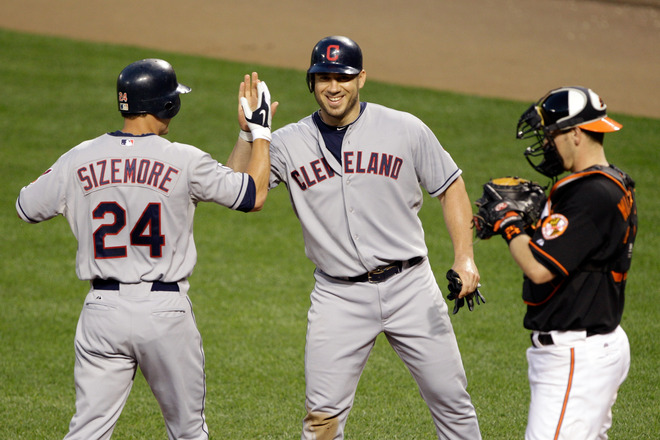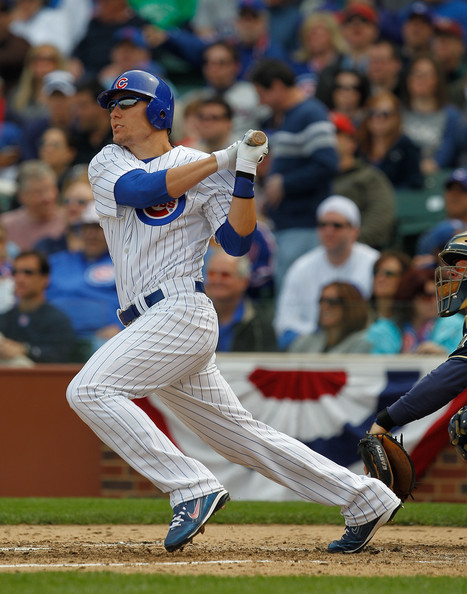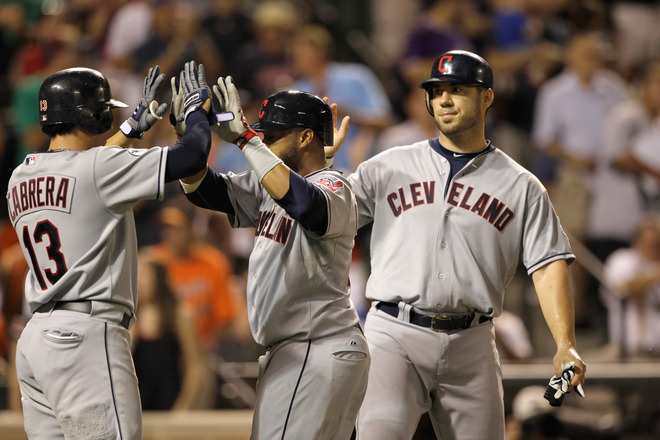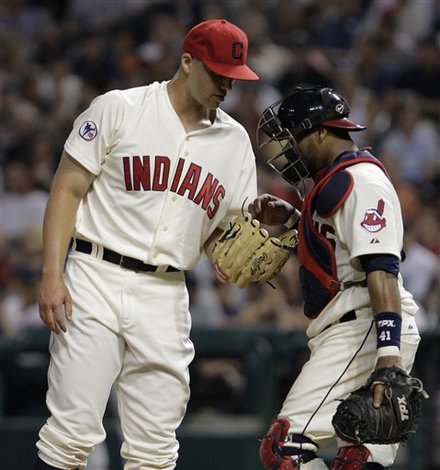 Indians Archive
Indians Archive  A Lazy Sunday on Building and Maintenance
A Lazy Sunday on Building and Maintenance

With the unofficial 2nd half of the season officially underway as the auditions for the 5th spot in Indians’ rotation begin in full force this afternoon, let’s all take a moment to realize that we are now more than half-way through the month of July with the Indians posting a 7-6 record in the month. While the Twins have bested the Tribe’s winning percentage in July, if this month is truly the time that the contenders start to separate themselves from the pretenders (the equivalent of “Moving Day” in a golf tournament), the Indians have kept pace in a flawed division, remaining atop the AL Central…a reminder that I’ll continue to throw out there in order to provide the proper perspective to a fanbase that is all too quick to see the warts of the Indians while ignoring the ugliness in the rest of the division.
With that in mind, realize that the Tigers’ run differential is now -27 in the month of July and that the Indians are the only team in the AL Central with a positive run differential (at +8) this late in the season. Does that slim positive run differential evoke all sorts of confidence in terms of the Indians’ chances against the heavyweights of the AL in September and October?
Probably not (and 4 of the 5 AL East teams have better run differentials than the Tribe), but it is July 17th and the Indians are the lead horse in an AL Central race that they’ve lost sight of by the second turn in the past three years, so excuse me while I enjoy it before getting into the turns of the rumor mill and into what could actually be a very real concern for the Indians going forward this season.
OK enough enjoyment; let’s get loose on a Lazy One…
With the rumor mill spinning as it always does at this time of the year and since everyone else is attempting to measure the potential impact that Ryan Spilborghs or Reed Johnson could have on the Indians’ season, I’ll embrace the lunacy for a little while before getting into the topic of the day because, as Craig Calcaterra wrote, “Crazy season is upon us. The semi-annual rumor-fest, in which people hear this and that and run wild with speculation. Occasionally — very occasionally — there is actually some hard news in all of this nonsense…you gotta keep your critical-thinking skills handy when it comes to this sort of thing.”
So let’s just bask in “crazy season” for a moment as, I’m not sure if you’ve heard this – but Beltran, Ludwick, and Willingham are three names to keep in mind for players that the Indians might add. While I’ve attempted to rationalize adding a piece like Mike Morse that helps fill a long-term organizational void (versatile RH bat) with others suggesting Hunter Pence (though he will command a king’s ransom, rightly or wrongly, as the “Face of the Astros) and more, there is no question that this is the time of year that names come flying at us and we try to rationalize whether this player would be a good addition or that player fills a need for the Tribe.
With that in mind, B-Pro’s John Perroto has a list of players that he could see getting moved at the deadline, with the usual suspects of Ludwick, Francoeur, Willingham, Melky, Beltran, Ryan Spilborghs, Reed Johnson, and Dexter Fowler all making the list, among others. However, perhaps the more interesting tidbit passed along by Perrotto is the assertion that “if the White Sox drop out of contention in the American League Central in the next two weeks, look for them to take calls on right fielder Carlos Quentin at the deadline”, which brings us back to the idea of the next two weeks having a profound impact on the AL Central for this year and beyond. Also included in Perrotto’s column is the nugget that “the Tigers are pushing hard to add a starting pitcher, and Dodgers right-hander Hiroki Kuroda is their top trade target” and while it’s likely that the Tigers will add something – usually a high-profile name…usually represented by Scott Boras (not that it means it’s a high-quality player) – you can almost already script the howls on July 31st and August 1st, regardless of what moves the Indians do or do not make.
Reason being is that everyone seems to want that “BIG BAT” and since there is only one of those that would fit the Indians’ needs in Beltran, perhaps it is noteworthy to pass this along from SI.com’s Jon Heymann in a piece in which he also identifies pieces that may (or may not be available) as Heymann passes along the opinion that the Indians’ desire for Beltran may not even matter all that much because of Beltran’s right to approve or veto any trade because of language in his contract. Heymann presents the potential Beltran/Indians situation thusly:
“The Indians are looking for an outfield bat. But Beltran doesn’t look like a match for them because while they are having a surprising season, it might be hard to imagine a storybook finish. So they are one contender Beltran is unlikely to approve in trade.”
 So while the North Coast has visions of Carlos Beltran coming to Cleveland, it’s not even all that clear that Beltran would want to come here, which is likely the reason that the Indians are targeting guys like the Cubs’ Jeff Baker, who is apparently not being made available by Chicago, despite their organizational standing and their ability to flip an ancillary part in a non-contending season for pieces that could help them in the future.
So while the North Coast has visions of Carlos Beltran coming to Cleveland, it’s not even all that clear that Beltran would want to come here, which is likely the reason that the Indians are targeting guys like the Cubs’ Jeff Baker, who is apparently not being made available by Chicago, despite their organizational standing and their ability to flip an ancillary part in a non-contending season for pieces that could help them in the future.
Can you hear it now?
Pouring out of your radio in the car…“The Indians need a Beltran and they go out and ask about or acquire a guy I’ve never heard of. Yeah, GREAT move Indians!”
Well, if they’re asking on Baker, they’re actually doing exactly what I had hoped that they would do as Baker is a versatile RH bat who can play 5 positions and is under club control through the end of NEXT season. Yes, Baker has a .746 OPS this season as a Utility Man for the Cubs, but he’s played 1B, 2B, 3B, RF, and LF this season while posting a .902 OPS vs. LHP. Remember when I wrote that the Indians should be looking for Casey Blake of about 6 years ago to be the versatile RH bat that they could move around the infield not just this year, but beyond?
That’s a guy like Jeff Baker…
But Baker’s “Q” rating isn’t equal to that of Beltran or even (inexplicably) Ludwick, who is still living off of one good year in StL when he was protected by Albert Pujols, so a move that could help the team for this year AND next year would likely be panned as “not being enough” or not showing that “commitment to spend that we’ve ALL BEEN PROMISED when the time is right”. Even then, according to Jon-Paul Morosi, the 30-year-old Baker who is under contract for another year-and-a-half isn’t being made available by a team that is 18 games under .500 and 11 ½ games out of the NL Central race.
While I would prefer a player like Morse (with Terry Pluto jumping on the bandwagon that I’m suddenly driving) because of his ability to hit both LHP and RHP, his controlled years, and his power over Baker, it’s a seller’s market at this point and while a player like Baker may never make his way to the North Coast because it takes two to tango, it’s the type of move that I could see (and would like to see) the Tribe making, even if it isn’t going to move the needle among the cle.com crowd and the sports-talk radio circus, where intelligence, logic, and perspective are in short supply…sometimes by design.
Regardless, the next two weeks figure to be full of the chicanery of “crazy season” while ignoring that the success or failure of the Indians as an offensive team is still going to be largely dependent upon the performances of Asdrubal, Sizemore, Santana, and (most notably) Hafner. In fact, if you look at what the Indians’ offense has done since Hafner’s return compared to the offensive production without him, the optimism for the offense (as it is currently) actually begins to grow:
28 Games Without Hafner (5/18 to 6/16)
3.03 Runs Scored Per Game
.620 Team OPS
10-18 Record
24 Games Since Hafner’s Return (6/17 through Friday night)
4.5 Runs Scored Per Game
.735 Team OPS
13-11 Record
 Want to know who they faced in that second stretch of 24 games?
Want to know who they faced in that second stretch of 24 games?
Two divisional leaders (PIT and SF), two second place teams (NYY and ARI), two more teams over .500 (CIN and TOR), a Colorado team 3 games under .500 and two games against the lowly Orioles…that’s who they were 13-11 against through Friday night since Hafner’s return. Part of that has to do with Hafner, but Santana’s OPS since Hafner has returned is .998 and the offense is going to be paced by Hafner, Santana, and Asdrubal with the hope that Sizemore’s knee(s) allow him to return to his early-season form causing the most optimism for the Tribe offense going forward.
Would a bat help that?
Probably, but the impact of a healthy and effective Hafner or a consistent Santana or Sizemore on this lineup is much more profound than adding a Josh Willingham or a Ryan Ludwick. Those guys would help to some degree, but more important than anything that the Indians are going to do externally to add to their offense is getting production from the players that are already in-house with the young(er) players like Brantley, Chisenhall, LaPorta, and potentially Kipnis being the complementary pieces around the middle of the Indians’ lineup that is going to carry the offensive burden.
Regardless, with all of the focus on adding that RH bat, what the rest of the Indians’ season figures to hinge upon, even more importantly than anything lineup-related, is the sustainability of their pitching staff, most notably the young arms at the top of their rotation. This always seems a little obvious when it’s pointed out, but the Indians have won with their pitching to this point in the season and if they’re going to continue to win, it will be because of that pitching continuing to be excellent as the season rolls on. As the bullpen’s effectiveness continues to please, there is something very interesting to watch in terms of the Indians’ rotation because of the youth of the current troika at the top and of the names that have already started to compete (with auditions continuing today and tomorrow) for Mitch Talbot’s spot in the rotation.
That aspect of the 2011 Indians’ team to watch has to do with the assumed inning counts for Masterson, Carrasco, and Tomlin as each player is likely to top their previous career highs in innings pitched, which could perhaps limit their effectiveness down the stretch as well as compromising success past this year. While I’ll get to all of that, let’s check the numbers from last year:
2010 Innings Pitched
Carrasco – 194 2/3 IP
Tomlin – 180 1/3 IP
Masterson – 180 IP
Truthfully, those numbers are palatable as the Indians have done a good job of ramping up the innings for those three young pitchers as they age and mature as pitchers. In case you couldn’t guess, those are totals for both AAA and MLB, with the current inning totals for the trio looking like this:
2011 Innings Pitched to date
Masterson – 128 2/3 IP
Tomlin – 120 2/3 IP
Carrasco – 108 IP
Remember that Carrasco spent some time on the DL earlier in the year which may have actually been a good thing in terms of limiting his innings and keeping him healthy and effective for this year and beyond.
Regardless, using Baseball Reference to project out what their 2011 inning totals would look like at their current pace, here is what B-Ref projects them to hit by the end of the year:
Masterson on pace for 226 IP
Tomlin on pace for 216 IP
Carrasco on pace for 202 IP
Not enormous numbers, but that’s a healthy bump in IP with the upticks and increases from last year to projections for this year for each of the three pitchers looking like this:
Masterson
2010 – 180 IP
2011 (Projected) – 226 IP
Increase – 46 IP
That would be a 25.5% increase in inning totals for Masterson from 2010 to 2011.
Tomlin
2010 – 180 1/3 IP
2011 – 216 IP
Increase – 35 2/3 IP
That would be a 19.8% increase in inning totals for Tomlin from 2010 to 2011.
Carrasco
2010 – 194 2/3 IP
2011 (Projected) – 202 IP
Increase – 7 1/3 IP
Remember that idea that Carrasco’s early DL stint may have not been that bad of a thing…well that’s only a 3.8% increase in Cookie’s inning totals from 2010 to 2011.
Monitoring these innings thrown by these young pitchers is important for a couple of reasons as these arms are still young and finding their way to consistency in MLB and their performance may be affected as their innings (particularly MLB innings and not AAA innings) mount going forward. If you’ve seen the recent performance of Josh Tomlin (5.61 ERA in his last 10 starts), you realize that these pitchers could be adversely affected by their mounting inning count as well as adjustments that MLB is going to make to them.
In the long-term sense, there is another concern with monitoring the inning count for these young arms as it relates to a trend first “discovered” by SI’s Tom Verducci, with the explanation for the “Verducci Effect” going a little something like this:
Named for Tom Verducci of Sports Illustrated, this is a negative forward indicator for pitcher workload. Verducci, who called this the ‘Year After Effect,’ found that pitchers under the age of 25 who have 30-inning increases year over year tend to underperform. Will Carroll independently found that pitchers who break the “Rule of 30” tend to get injured. Carroll renamed this ‘rule’ the Verducci Effect in honor of the man who initially found the evidence.
 It is true that both Masterson and Tomlin fall on the north side of that “age 25” border and Carrasco’s 2011 inning total looks to be the one that falls closest to where he finished last year, but if you’re looking at the long-term effects of what a significant increase can do to a particular player, you only have to look to one Fausto Carmona. Lest you forget, Carmona (age 23) threw 230 innings (including playoffs) at the age of 23 in 2007, this inning total coming on the heels of a year in which he threw only 102 1/3 innings in 2006 as a 22-year-old. Since that increase, Carmona has a 5.07 ERA and a 1.50 WHIP over 97 starts from the beginning of the 2008 season.
It is true that both Masterson and Tomlin fall on the north side of that “age 25” border and Carrasco’s 2011 inning total looks to be the one that falls closest to where he finished last year, but if you’re looking at the long-term effects of what a significant increase can do to a particular player, you only have to look to one Fausto Carmona. Lest you forget, Carmona (age 23) threw 230 innings (including playoffs) at the age of 23 in 2007, this inning total coming on the heels of a year in which he threw only 102 1/3 innings in 2006 as a 22-year-old. Since that increase, Carmona has a 5.07 ERA and a 1.50 WHIP over 97 starts from the beginning of the 2008 season.
Nobody figures to make THAT big of a jump, but if the Indians’ continued renaissance is going to be built on the arms that are currently in the Indians’ rotation and just beneath it, the Indians are going to have to be cautious about use and inning counts…something that may not be all that easy if the Indians find themselves waist-deep in a playoff race in September with innings mounting for the top of their rotation. While an easy “answer” would be that the Indians can start to lean on their depth in AAA if needed, this is where things get interesting as (I’m not sure if you noticed) here are the inning counts for 2011 and 2010 for the trio of pitchers that looks to be closest to representing the current cavalry for the rotation and who are now going to start to slot themselves for Talbot’s spot in the rotation:
Jeanmar Gomez
2010 – 155 1/3 IP
2011 – 112 IP to date
Zach McAllister
2010 – 149 2/3 IP
2011 – 101 IP to date
Dave Huff
2010 – 154 IP
2011 – 101 1/3 IP to date
In case you were wondering, these guys all have inning totals at or above where Carrasco was prior to his Saturday start, which means that inning totals are going to come into play for these pitchers as much as they will for Masterson, Carrasco, and Tomlin. Maybe you can look at those arms and figure that the Indians will be able to figure out some arrangement to protect these young arms (for now AND the future), but if the Indians are hanging around in the AL Central race for the next two months, they’re going to want to put their best arms forward and balancing that caution and aggressiveness is going to be a challenge for the team.
Perhaps you could take this as a call that the Indians should be more intent on adding a starting pitcher over a RH bat, but the Indians may just have the internal arms to compile all of the innings that have yet to be pitched. Certainly, Alex White returning would help matters and it may have been a blessing in disguise for White to remain shelved for some time as his inning count has been limited due to the finger injury and, while his 2010 and 2011 numbers may belie his usefulness, the Indians always have Mitch Talbot to eat innings for the team if need be. However, with Gomez, McAllister, Huff, White, and Talbot, you’re talking about the back-end-of-the-rotation arms…and those aren’t the pitchers that have put the Indians in their current position of contention.
The Indians still sitting at the top of the AL Central (and I’ll keep typing that as long as it is true) is due to the top of the rotation and the bullpen behind it with some timely offense thrown in to achieve 1st place to this point. While the offense may or may not need a boost and may or may not GET a boost, the ability of the Indians to stay in the AL Central race is going to be keyed by the top three arms in their rotation to stay effective through the final 2 ½ months of the season.
As innings mount for each young pitcher in the rotation (and Masterson, Carrasco, and Tomlin have 3 of the 33 lowest ERA’s in the AL to date), the Indians may have to get creative to maximize effectiveness and protect their present and their future. Then again, with the Trading Deadline just 2 ½ weeks away, the Indians may be having to plug into that “creative side” more than a couple times as this roller coaster ride of a 2011 season rolls on…
- NBA Announces 2013-2014 Schedule
- Browns Ink Sharknado
- Sharknado A No-Show For Rookie Camp
- Trent Richardson Out Until Training Camp
- Browns Sign Brandon Jackson
- Carrasco Suspended Eight Games
- Browns Add to Wide Receiver Depth with David Nelson
- Browns Need to Learn from Past Draft Mistakes
- Browns Release Chris Gocong and Usama Young
- Browns Missing on Grimes Disappointing, But Not The End
The TCF Forums
- Chris Grant's first 3 drafts
Kingpin74 (Tuesday, January 21 2014 10:13 AM) - The 2014 Offseason Thread
googleeph2 (Tuesday, January 21 2014 9:36 AM) - 2015 Recruiting
furls (Tuesday, January 21 2014 6:57 AM) - Mike Brown
YahooFanChicago (Monday, January 20 2014 11:15 PM) - Movies coming out
HoodooMan (Monday, January 20 2014 9:34 PM) - 2014 Hoops Hockey Hijinx
jpd1224 (Monday, January 20 2014 4:44 PM) - 2014 Recruiting
jclvd_23 (Monday, January 20 2014 2:26 PM) - Wish List - #4 Pick
Hikohadon (Monday, January 20 2014 1:26 PM) - Official- Browns Coach Search/Rumors
OldDawg (Sunday, January 19 2014 6:48 PM) - #1 overall pick Anthony Bennett
TouchEmAllTime (Sunday, January 19 2014 1:28 PM)



